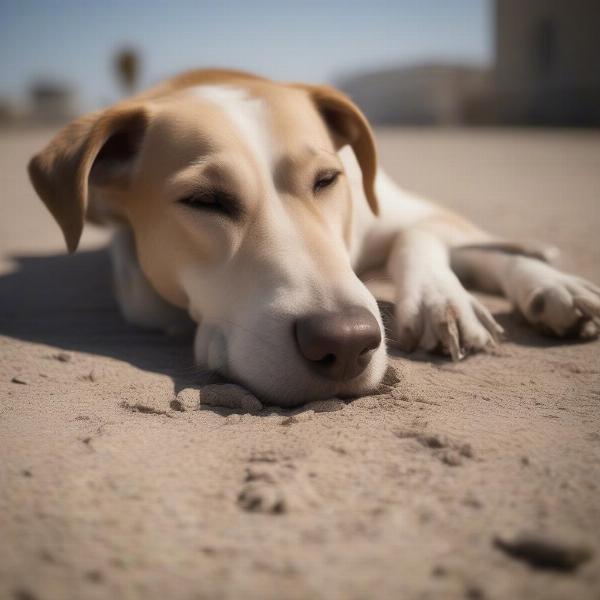Lip licking in dogs is a common behavior, but excessive licking can be a sign of an underlying issue. While occasional lip licks might just mean your dog is anticipating a tasty treat, persistent licking can indicate anything from anxiety to dental problems. So, if you’re noticing your furry friend constantly licking their lips, it’s important to understand the potential reasons and know when to seek veterinary advice.
Decoding Your Dog’s Lip Licking: Common Causes
There are numerous reasons why your dog might be excessively licking their lips. Some are relatively benign, while others can signal more serious health concerns. Here’s a breakdown of some of the most common culprits:
-
Nausea: Just like humans, dogs may lick their lips when they’re feeling nauseous. This could be due to a simple upset stomach, motion sickness, or a more serious digestive issue.
-
Dental Problems: A painful tooth or gum infection can cause discomfort and increased salivation, leading to excessive lip licking. Look for other signs like bad breath, difficulty eating, or pawing at the mouth.
-
Dry Mouth: Dehydration can lead to dry mouth, prompting your dog to lick their lips for moisture. Ensure your dog always has access to fresh water, especially during hot weather or after exercise.
-
Stress and Anxiety: Lip licking can be a displacement behavior, a way for dogs to cope with stress or anxiety. Observe if the licking coincides with specific triggers like loud noises, unfamiliar people, or changes in routine.
-
Allergies: Allergies to food, environmental allergens, or even certain materials can cause itching and irritation around the mouth, leading to increased licking.
-
Oral Foreign Bodies: Sometimes, a small piece of food, grass, or another foreign object can get stuck in your dog’s mouth, causing irritation and licking.
-
Cognitive Dysfunction: In older dogs, excessive lip licking can be a sign of cognitive decline, similar to dementia in humans.
-
Medication Side Effects: Certain medications can cause dry mouth or nausea as side effects, leading to increased lip licking.
When to Worry and Seek Veterinary Care
While occasional lip licking is normal, persistent and excessive licking warrants a visit to the vet. If you notice any of the following accompanying symptoms, it’s crucial to seek professional advice:
- Changes in appetite or drinking habits
- Vomiting or diarrhea
- Lethargy or weakness
- Pawing at the mouth
- Bad breath
- Drooling
- Swelling around the mouth
Your vet can perform a thorough examination to determine the underlying cause of the lip licking and recommend appropriate treatment.
Is It Just Hunger? Distinguishing Normal from Excessive Licking
It’s perfectly normal for dogs to lick their lips in anticipation of food or after a tasty meal. However, if the licking is constant, even when food isn’t present, it’s likely a sign of something else. dog licking his mouth Observe your dog’s behavior and look for patterns. Does the licking increase in certain situations or at specific times of the day? This can provide valuable clues for your veterinarian.
 Dog Licking Lips Due to Dry Mouth
Dog Licking Lips Due to Dry Mouth
Managing Stress and Anxiety in Lip-Licking Dogs
If your vet determines that stress or anxiety is the culprit, there are several strategies you can try to help your furry friend:
- Create a calm and predictable environment: Minimize changes in routine and provide a safe and comfortable space for your dog to retreat to when feeling overwhelmed.
- Enrichment activities: Provide plenty of mental and physical stimulation to help reduce stress. This can include puzzle toys, interactive games, and regular exercise. dog licking toy
- Behavior modification techniques: Work with a certified dog trainer or behaviorist to implement positive reinforcement training and desensitization techniques.
- Natural calming aids: Consult with your vet about using natural calming supplements like pheromone diffusers or calming treats.
Conclusion: Addressing Your Dog’s Lip Licking
Excessive lip licking in dogs shouldn’t be ignored. By paying close attention to your dog’s behavior and seeking veterinary advice when necessary, you can address the underlying cause and ensure your furry friend’s health and well-being. Remember, while some lip licking is normal, persistent licking warrants further investigation. Don’t hesitate to my dog constantly licks his lips reach out to your vet if you have any concerns.
FAQ
-
Q: Is it normal for my dog to lick his lips after eating?
A: Yes, occasional lip licking after eating is perfectly normal. -
Q: How can I tell if my dog’s lip licking is excessive?
A: If the licking is constant, even when your dog isn’t eating or anticipating food, it’s likely excessive. -
Q: What should I do if my dog is constantly licking his lips?
A: Consult with your veterinarian to determine the underlying cause. -
Q: Can anxiety cause a dog to lick his lips excessively?
A: Yes, stress and anxiety can lead to displacement behaviors like lip licking. -
Q: What are some signs of dental problems in dogs?
A: Bad breath, difficulty eating, pawing at the mouth, and excessive drooling can be signs of dental issues. -
Q: Are there any home remedies for dry mouth in dogs?
A: Ensure your dog always has access to fresh water. You can also add ice cubes to their water bowl. -
Q: Can allergies cause lip licking in dogs?
A: Yes, allergies to food, environmental factors, or materials can irritate the mouth and cause licking.
Related Articles:
About ILM Dog:
ILM Dog is your trusted international resource for expert dog care advice. We offer comprehensive information on dog breeds, health, training, nutrition, grooming, and much more. From puppy care to senior dog care, our goal is to empower dog owners worldwide with the knowledge they need to provide the best possible care for their canine companions. We specialize in Breed Selection, Health & Medical Care, Training & Behaviour, Nutrition & Feeding, Grooming & Hygiene and Products & Accessories. Contact us today for personalized advice: Email: [email protected], Phone: +44 20-3965-8624.